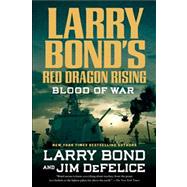
LARRY BOND is the author of numerous New York Times bestselling thrillers, including Vortex, Cauldron, and The Enemy Within. A former Naval Intelligence officer, warfare analyst and anti-submarine technology expert, he makes his home in Springfield, Virginia.
JIM DeFELICE is the author of many military based thriller novels and is a frequent collaborator with Stephen Coonts, Larry Bond, and Richard Marcinko, among others. He lives in New York.
The New copy of this book will include any supplemental materials advertised. Please check the title of the book to determine if it should include any access cards, study guides, lab manuals, CDs, etc.
The Used, Rental and eBook copies of this book are not guaranteed to include any supplemental materials. Typically, only the book itself is included. This is true even if the title states it includes any access cards, study guides, lab manuals, CDs, etc.